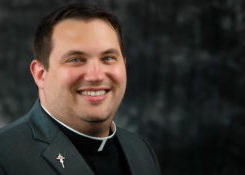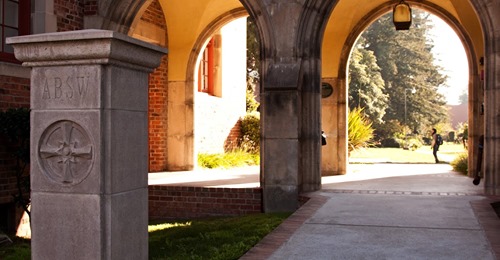
Fr. James Smith, C.PP.S., is a first-year student at the Graduate Theological Union (GTU) in Berkeley, Calif., and lives in the Missionaries’ Sonnino Mission House. He hopes to obtain a doctoral degree in theology, focusing on pastoral theology and care. From 2016–20, he served in the St. Henry, Ohio, Cluster, including the past three years as parochial vicar. We asked him a few questions about his new life and times.
Your classes are all online. Are you missing the give-and-take of the classroom?
This is the first time in my life that I have taken classes online. Due to COVID-19, most universities in California have switched to online classes for the fall and likely for the spring. GTU is affiliated with Cal-Berkeley, so GTU tends to follow the lead from Berkeley.
Conversations on Zoom are not the same as in person. However, the mute button is really nice. As I mentioned to parishioners in St. Henry when we began streaming, I hoped they would like the Masses a lot more because if they didn’t like what I was preaching, they could just mute the livestream and then unmute it after I finished preaching. The ten-step commute from my bedroom to my office for online classes is the most convenient I’ve ever had.
One of the goals of theology and religious studies is to be connected to what normal people experience, something lofty academics sometimes lose sight of. The COVID-19 pandemic has inserted a lot of inconvenience into the lives of everyone. Classes on Zoom and no in-person school stuff is inconvenient, but it’s not the same level of inconvenience most people are experiencing around work, family and the other parts of life the pandemic has changed so much.
Are there any professors who have really impressed you? Any nuggets of wisdom that you can share with us?
Across eight different schools, six centers, and five affiliates, GTU is expansive in its diversity. Theology is unique enough of a field in itself, but then through the first department meeting and hearing each professor’s and student’s research interests, we discover a wide range of research and interests.
One of the things that puts doctoral work apart from other stints in school is the self-direction or focus around exams and writing, with classes serving a brief introduction. My doctoral seminar prof, who finds a way to make three hours each week on Zoom interesting and engaging, routinely says, “Put in the work, and trust the process.”
What is the homework assignment so far that has given you the most stress?
The volume of reading surprised me. I was expecting a lot, but due to the way the schedule fell, I ended up with an extra class than was recommended. Next semester will be the same. A book a week is normal in seminars, which explains the backdrop of professors’ offices with five-shelves-high lines of books after books.
It’s also a little intimidating and encouraging to be expected to do more than summarize the authors or the reading but to take it a step further in my own original ideas. Stay-at-home orders make it very difficult for me to come up with an excuse to the professor why I didn’t get the reading done. So, though it’s not ideal and kind of weird to move across the U.S. to stay at home most of the time, there is a benefit of starting back in school in the middle of a global pandemic.
Do you miss the day-to-day ministry of parish life? Will you have the opportunity for ministry as a student?
I miss the connections and relationships with parishioners and staff. I told the staff in St. Henry that the four years I spent in the cluster was the longest time I had spent in one place since I entered formation.
I have offered to help at parishes in Oakland and San Francisco, but with the pandemic still an issue in the area, church services have not returned to normal throughout California. I am also hoping to help with some lay formation programs in the area, both to get connected with them and to test the waters of teaching a bit.
Any advice for others who are thinking of going back to school/trying something new in their lives?
I think as a religious community we get paralyzed in thinking about the utility or efficiency of what we’re doing or what we might do. Salary and stability are the centripetal and centrifugal forces of the American myth. Years ago in my first semester at CTU, Fr. Jim Bacik told his class that he repeatedly told his parish staff, “Delegate and train volunteers to work yourself out of a job. There’s always more that needs to be done in ministry.”
Around the new creation in this emerging province of C.PP.S. in the United States, there’s plenty of needs and work for our witness and contribution. We just need to trust in our own creativity and gifts to step into new work. And when it feels like we’re unsuccessful or failing 70 percent of the time, like most of my papers in class, it’s helpful to remember a .300 batting average is pretty good.

